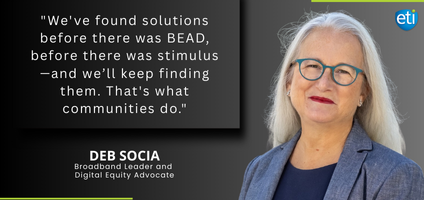
The following summary has been condensed for length and readability. To listen to the full discussion, click here. This episode is sponsored by ETI Software and VETRO FiberMap.
In this episode of The Broadband Bunch, recorded at CBAN 2025 in Ames, Iowa, host Brad Hine sits down with Deb Socia—retired CEO of The Enterprise Center and long-time digital equity champion—for a conversation about broadband, community engagement, and building trust through technology.
Returning for her third CBAN conference, Deb Socia brought both wisdom and warmth to the event. Although recently retired from her full-time leadership role at The Enterprise Center in Chattanooga, Deb remains deeply engaged in the broadband space as a leadership consultant and advocate for equitable access.
Brad and Deb kicked off their conversation by reflecting on the energy of this year’s event and the growing enthusiasm around community broadband across rural America.
One of the core themes of the episode is the importance of marketing from the beginning. Deb emphasized that ISPs and municipalities must begin their outreach early—before the fiber is even in the ground.
“You can’t wait until the network is built to start marketing,” she explained. “You have to build brand loyalty by helping people understand the value of broadband from the start.”
This includes managing expectations, addressing community concerns, and ensuring people feel included in the journey—not just as customers, but as stakeholders.
Deb shares that the most common questions she receives from broadband leaders are about funding and take rates. Her advice? Every community is different. Understanding local and state-specific funding mechanisms is key—and so is building trust.
Trust, she says, is a recurring thread in all successful broadband efforts. Whether it’s through faith leaders, librarians, or school officials, trusted messengers help communities feel confident in the promise of connectivity.
As a lifelong educator, Deb brings a personal lens to her work in digital inclusion. She reflects on how the COVID-19 pandemic brought digital equity to the forefront—and how communities responded.
“We always had solutions—even before BEAD or stimulus funds. We can’t give up now. People are depending on us.”
She recounts powerful stories, including a 90-year-old woman who used digital literacy classes to connect with her grandchildren on FaceTime—transforming her quality of life.
Deb paints a vivid picture of what it means when broadband becomes a source of local pride. In Chattanooga, where the municipal network is renowned for its speed, even bus drivers and hotel staff proudly reference their “quantum network.”
This, she says, is a result of community-wide communication and leadership development—leaders equipped with the right words to explain and champion broadband’s benefits. “Talking points matter,” Deb says, especially when they empower others to tell the story themselves.
Before her broadband work, Deb was a teacher and principal in Boston—where she helped launch one of the country’s first one-to-one laptop programs in an urban school. Contrary to critics’ concerns, student engagement and creativity soared. Discipline referrals dropped. And students began leading tech initiatives in their own communities.
This experience shaped Deb’s lifelong belief: that young people, when given access and trust, will rise to the occasion—and that low-income or rural communities are just as capable of technological innovation as any other.
A major concern Deb voiced during the episode is the lack of stability in federal and state funding. From grant delays to rule changes midstream, unpredictability is hampering the ability of nonprofits and small ISPs to build long-term strategies.
“We may not like the rules,” she says, “but let’s not change them in the middle.”
Predictability, she argues, is essential for planning—and respect. Communities deserve more than “maybe.”
For Deb, her proudest legacy isn’t a number or a milestone—it’s people. From students and parents in her early classrooms to the next generation of broadband advocates, she’s committed to mentorship and leadership development.
“Who’s going to replace us? That’s what I care about.”
Brad connected with this message and shared his own story about using AI with his son’s basketball team to map college opportunities. Their shared excitement about youth, technology, and learning underscored a hopeful tone for the future.
In closing, Deb and Brad discussed the rise of AI and the role of storytelling in broadband advocacy. While data is essential for grants and policy decisions, Deb insists that stories are what change minds—and hearts.
“The story gets to your heart. The data gets to your mind. When you have both—you’ve got a convert.”
© 2025 Enhanced Telecommunications.